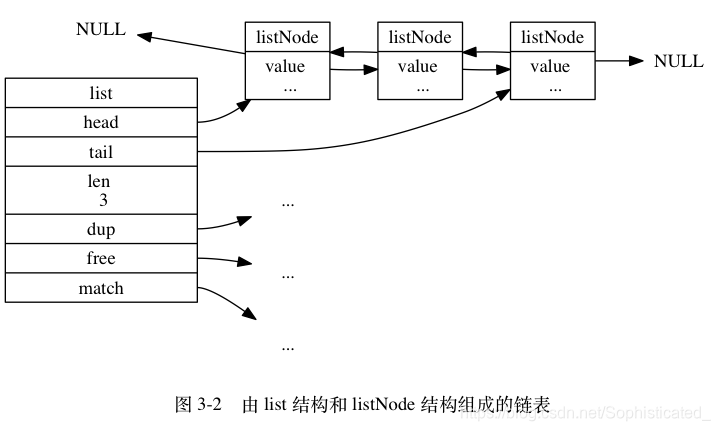版权声明:本文为博主原创文章,未经博主允许不得转载。 https://blog.csdn.net/Sophisticated_/article/details/84330767
基于Redis5.0
链表提供了高效的节点重排能力, 以及顺序性的节点访问方式, 并且可以通过增删节点来灵活地调整链表的长度
每个链表节点使用一个 adlist.h/listNode 结构来表示:
//adlist.h - A generic doubly linked list implementation
/* Node, List, and Iterator are the only data structures used currently. */
typedef struct listNode {
struct listNode *prev;
struct listNode *next;
void *value;
} listNode;

虽然仅仅使用多个 listNode 结构就可以组成链表, 但使用 adlist.h/list 来持有链表的话, 操作起来会更方便:
typedef struct list {
listNode *head;
listNode *tail;
// 节点值复制函数
void *(*dup)(void *ptr);
// 节点值释放函数
void (*free)(void *ptr);
// 节点值对比函数
int (*match)(void *ptr, void *key);
unsigned long len;
} list;
dup函数用于复制链表节点所保存的值;free函数用于释放链表节点所保存的值;match函数则用于对比链表节点所保存的值和另一个输入值是否相等。

list的迭代器Iterator,用来方便快速遍历list:
typedef struct listIter {
listNode *next;
//遍历方向
int direction;
} listIter;
/* Directions for iterators */
#define AL_START_HEAD 0
#define AL_START_TAIL 1
与Java集合中的Iterator概念类似
Redis 的链表实现的特性可以总结如下:
- 双端: 链表节点带有
prev和next指针, 获取某个节点的前置节点和后置节点的复杂度都是 O(1) 。 - 无环: 表头节点的
prev指针和表尾节点的next指针都指向 NULL , 对链表的访问以NULL为终点。 - 带表头指针和表尾指针: 通过
list结构的head指针和tail指针, 程序获取链表的表头节点和表尾节点的复杂度为 O(1) 。 - 带链表长度计数器: 程序使用
list结构的 len 属性来对 list 持有的链表节点进行计数, 程序获取链表中节点数量的复杂度为 O(1) 。 - 多态: 链表节点使用
void*指针来保存节点值, 并且可以通过list结构的dup、free、match三个属性为节点值设置类型特定函数, 所以链表可以用于保存各种不同类型的值。
更方便的宏定义:
/* Functions implemented as macros */
#define listLength(l) ((l)->len)
#define listFirst(l) ((l)->head)
#define listLast(l) ((l)->tail)
#define listPrevNode(n) ((n)->prev)
#define listNextNode(n) ((n)->next)
#define listNodeValue(n) ((n)->value)
#define listSetDupMethod(l,m) ((l)->dup = (m))
#define listSetFreeMethod(l,m) ((l)->free = (m))
#define listSetMatchMethod(l,m) ((l)->match = (m))
#define listGetDupMethod(l) ((l)->dup)
#define listGetFree(l) ((l)->free)
#define listGetMatchMethod(l) ((l)->match)
链表API:
创建一个新链表:
/* Create a new list. The created list can be freed with
* AlFreeList(), but private value of every node need to be freed
* by the user before to call AlFreeList().
*
* On error, NULL is returned. Otherwise the pointer to the new list. */
list *listCreate(void)
{
struct list *list;
if ((list = zmalloc(sizeof(*list))) == NULL)
return NULL;
list->head = list->tail = NULL;
list->len = 0;
list->dup = NULL;
list->free = NULL;
list->match = NULL;
return list;
}
移除链表里的所有元素:
/* Remove all the elements from the list without destroying the list itself. */
void listEmpty(list *list)
{
unsigned long len;
listNode *current, *next;
current = list->head;
len = list->len;
while(len--) {
next = current->next;
if (list->free) list->free(current->value);
zfree(current);
current = next;
}
list->head = list->tail = NULL;
list->len = 0;
}
添加一个元素到链表头:
/* Add a new node to the list, to head, containing the specified 'value'
* pointer as value.
*
* On error, NULL is returned and no operation is performed (i.e. the
* list remains unaltered).
* On success the 'list' pointer you pass to the function is returned. */
list *listAddNodeHead(list *list, void *value)
{
listNode *node;
if ((node = zmalloc(sizeof(*node))) == NULL)
return NULL;
node->value = value;
if (list->len == 0) {
list->head = list->tail = node;
node->prev = node->next = NULL;
} else {
node->prev = NULL;
node->next = list->head;
list->head->prev = node;
list->head = node;
}
list->len++;
return list;
}
删除一个指定节点:
/* Remove the specified node from the specified list.
* It's up to the caller to free the private value of the node.
*
* This function can't fail. */
void listDelNode(list *list, listNode *node)
{
if (node->prev)
node->prev->next = node->next;
else
list->head = node->next;
if (node->next)
node->next->prev = node->prev;
else
list->tail = node->prev;
if (list->free) list->free(node->value);
zfree(node);
list->len--;
}
这里对链表的增删改查如果之前学习过数据结构就非常容易理解了
获取链表的迭代器Iterator:
/* Returns a list iterator 'iter'. After the initialization every
* call to listNext() will return the next element of the list.
*
* This function can't fail. */
listIter *listGetIterator(list *list, int direction)
{
listIter *iter;
if ((iter = zmalloc(sizeof(*iter))) == NULL) return NULL;
if (direction == AL_START_HEAD)
iter->next = list->head;
else
iter->next = list->tail;
iter->direction = direction;
return iter;
}
通过链表的迭代器Iterator获取链表的下一个元素:
/* Return the next element of an iterator.
* It's valid to remove the currently returned element using
* listDelNode(), but not to remove other elements.
*
* The function returns a pointer to the next element of the list,
* or NULL if there are no more elements, so the classical usage patter
* is:
*
* iter = listGetIterator(list,<direction>);
* while ((node = listNext(iter)) != NULL) {
* doSomethingWith(listNodeValue(node));
* }
*
* */
listNode *listNext(listIter *iter)
{
listNode *current = iter->next;
if (current != NULL) {
if (iter->direction == AL_START_HEAD)
iter->next = current->next;
else
iter->next = current->prev;
}
return current;
}
搜索返回给定值的节点:
/* Search the list for a node matching a given key.
* The match is performed using the 'match' method
* set with listSetMatchMethod(). If no 'match' method
* is set, the 'value' pointer of every node is directly
* compared with the 'key' pointer.
*
* On success the first matching node pointer is returned
* (search starts from head). If no matching node exists
* NULL is returned. */
listNode *listSearchKey(list *list, void *key)
{
listIter iter;
listNode *node;
listRewind(list, &iter);
while((node = listNext(&iter)) != NULL) {
if (list->match) {
if (list->match(node->value, key)) {
return node;
}
} else {
if (key == node->value) {
return node;
}
}
}
return NULL;
}